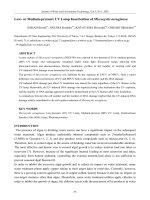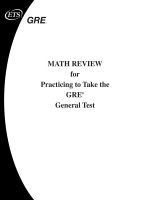Math Anxiety: Myth or Monster?
Bạn đang xem bản rút gọn của tài liệu. Xem và tải ngay bản đầy đủ của tài liệu tại đây (416.91 KB, 36 trang )
Math
Anxiety:
or of
National
CouncilMyth
of Teachers
Monster? Mathematics
79th Annual Conference
Orlando, Florida
National Council of Teachers of
Mathematics
Central Regional Conference
Paducah,
Kentucky
Math World:
New Standards for the New Millennium
Kay Haralson, Associate
Professor
Austin Peay State University
Clarksville, Tennessee
State supported liberal arts institution
Clarksville, Tennessee
Approximate enrollment of 6500
students
Approximately 50% of the student
body is greater than 24 years of age.
Definition of Math Anxiety
“Tobias and Weissbrod (1980) defined math anxiety as the panic, helplessness,
paralysis, and mental disorganization that arises among some people when they
are required to solve a mathematical problem.”
Fiore, 1999
Definition of Math Anxiety
Robinson and Simone (1976) defined math anxiety as “feelings of tension and
anxiety that interfere with the manipulation of numbers and the solving of
problems in a wide variety or ordinary life and academic situations.”
Definition of Math Anxiety
Math anxiety is a learned emotional response to one or more of the following:
1.
2.
3.
4.
Listening to a lecture
Participating in a math class
Working through problems
Discussing mathematics
/>_affairs_support_center/mathanx.htm
Physical Symptoms of Math
Anxiety
queasy stomach, butterflies
clammy hands and feet
increased or irregular heartbeat
muscle tension, clenched fists
tight shoulders
Physical Symptoms of Math
Anxiety
feeling faint, shortness of breath
headache
shakiness
dry mouth
cold sweat, excessive perspiration
Psychological Symptoms of Math
Anxiety
negative self-talk
panic or fear
worry and apprehension
desire to flee the situation
a feeling of helplessness or
or avoid it altogether
inability to cope
Psychological Symptoms of Math
Anxiety
mental disorganization, incoherent
feelings of failure or worthlessness
extreme tension and nervousness
inability to recall material studied
thinking
Math Anxiety can be
Related to
attitudes of parents, teachers or other
environment
some specific incident in a student’s
frightening
or embarrassing
poor self-concept caused by past
people in the learning
math history which was
history of failure
Math Anxiety can be Related
to
teaching techniques which emphasize:
time limits
the right answer
speed in getting the answer
competition among students
working in isolation
memorization rather than
understanding
Math Anxiety can be Related
to
student attitudes:
dropped stitch concept
distrust of intuition or ability
negative self-talk
giving up before really beginning
depression and feelings of failure
expectations of divine intervention
Causes of Math Anxiety
“Evidence suggests that math anxiety results more from the way the subject is
presented than from the subject itself.” -- Greenwood
Causes of Math Anxiety
Few math classes are structured in such a way as to relieve anxiety. There will
always be time limits, right answers, and competition. Reducing math anxiety
will not make students ‘smarter’ in math. However, it could allow a students to
reach their full potential.
Suggestions for Reducing Math
Anxiety
“Many people label mathematics as hard, when it would be more correct to say
that learning mathematics is hard work.”
Collins
-- Mitchell &
Suggestions for Reducing Math
Anxiety
Students are responsible for their feelings,
attitudes, level of classroom and test
preparation. The most effective thing a
student can do to reduce their math anxiety
is to
BE PREPARED.
Suggestions for Reducing Math
Anxiety
Often, students with math anxiety need to be taught how to ‘be prepared.’
A teacher of mathematics not only is responsible for the instruction of
mathematical concepts, but is also responsible for helping students ‘learn to
learn mathematics.’
Suggestions for Reducing Math
Anxiety
Teachers can offer the following suggestions to students:
◊ Realize you are not alone. Many
people suffer from feelings of anxiety.
◊ Realize that there can be psychological as well as physiological reactions.
◊ Explore relaxation techniques to control the physiological reactions of math
anxiety.
Suggestions for Reducing Math
Anxiety
◊ Do not rationalize your
never good at math.”
What you were is not the
performance by thinking,
“ “I was
same as what you can become.”
◊ Take an active role in learning ‘how to’ study mathematics by attending study
skills workshops and reading study skills material.
Suggestions for Reducing Math
Anxiety
◊ Practice mathematics every day. Be willing
to spend many hours developing your
confidence in solving mathematical
problems.
◊ Focus on the successes you have
experienced in mathematics rather than the
failures.
◊ Get to know your instructor so you will feel
more comfortable in approaching her for
assistance outside the class.
Suggestions for Reducing Math
Anxiety
◊ Do not try to merely survive a mathematics course through memorization alone.
UNDERSTANDING concepts is the key to successfully learning mathematics.
◊ You cannot study ‘too much’ or ‘too often.’ Overlearn the test material to enable
you to recall facts, formulas and procedures quickly.
Suggestions for Reducing Math
Anxiety
◊ Approach the learning
of mathematics
prepared for the
experience and DON’T
GIVE UP.
Student Responsibilities
Students have responsibilities in their mathematics learning environment:
Students must understand that learning mathematics is time consuming.
Students must understand they are responsible for their own learning.
Students should appropriately
prepare for class.
Student Responsibilities
Students must take responsibility for learning material presented in their
absence.
Students should seek assistance when they need help and ask questions when
the don’t understand.
Students must understand that in order to learn mathematical concepts, they
must not be afraid to make mistakes.
Student Responsibilities
Students should practice mathematics daily, with the intent to understand the
material, not just go through the motions.
Students should prepare for a test in a fashion similar to an athlete
performer preparing for
an event.
or a









